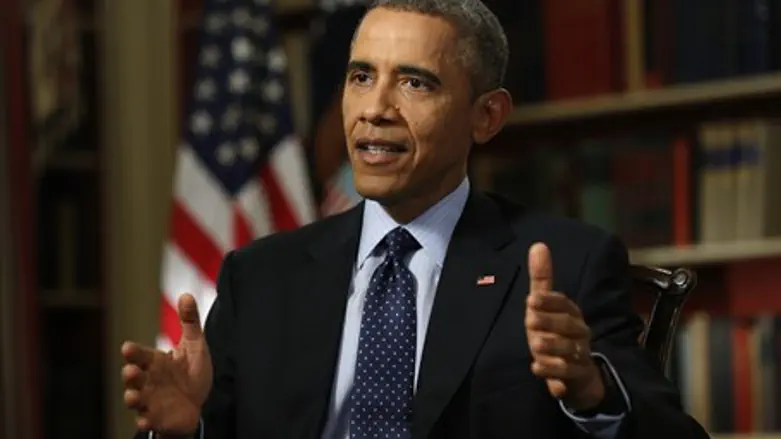
US President Barack Obama has warned the White House was "evaluating its options" vis-a-vis imposing a two-state solution to the Arab-Israeli conflict, and specifically regarding the US's commitment to veto unilateral Palestinian moves at the UN.
Obama made the comments in a Huffington Post interview, late last week, in which he made his first direct response to the reelection of Binyamin Netanyahu's Likud party to lead the next Israeli government.
Asked about Netanyahu's comments both during and after the Israeli elections - first rejecting the possibility of two states given the current realities in the region, and later insisting he was still committed in principle - Obama said he had spoken directly to the Israeli PM to emphasize his own stance.
"I did indicate to him that we continue to believe that a two-state solution is the only way for the long-term security of Israel, if it wants to stay both a Jewish state and democratic," the president said. "And I indicated to him that given his statements prior to the election, it is going to be hard to find a path where people are seriously believing that negotiations are possible."
Asked whether the US would "continue to oppose Palestinian efforts to gain statehood at the United Nations", Obama added that "we’re evaluating what’s taking place."
"I think Prime Minister Netanyahu still has to form a government; we’ll be in close consultation with them. We're going to make sure, regardless of disagreements we have on policy, that our military and intelligence cooperation to keep the Israeli people safe continues and that cooperation also helps the American people stay safe.
"But we are going to continue to insist that, from our point of view, the status quo is unsustainable. And that while taking into complete account Israel's security, we can't just in perpetuity maintain the status quo, expand settlements. That's not a recipe for stability in the region."
Asked whether he believed Netanyahu was "serious about a Palestinian state," Obama answered bluntly that "we take him at his word when he said that it wouldn't happen during his prime ministership, and so that's why we've got to evaluate what other options are available to make sure that we don't see a chaotic situation in the region."
Obama also addressed the possible impact of Netanyahu's reelection on ongoing nuclear talks with Iran.
Netanyahu has been the most vocal opponent of what many both in the Middle East and the West see as an impending "bad deal" which would allow Iran to maintain nuclear weapons capability.
But despite that the president said he didn't think the Israeli elections results would have a significant impact on the course of negotiations with Iran.
"Obviously there's significant skepticism in Israel generally about Iran. And understandably. Iran has made vile comments, anti-Semitic comments, comments about the destruction of Israel. It is precisely for that reason that even before I became president, I said Iran could not have a nuclear weapon," he said.
"What is going to have an effect on whether we get a deal done is, number one, is Iran prepared to show, to prove to the world that it is not developing a nuclear weapon, and can we verify that in an intrusive, consistent way."
Tellingly, Obama voiced significant skepticism about the course of negotiations, saying that "frankly, they have not yet made the kind of concessions that are I think going to be needed for a final deal to get done."
Nevertheless, he said the possibility was still there, although "we've still got some more to do."
